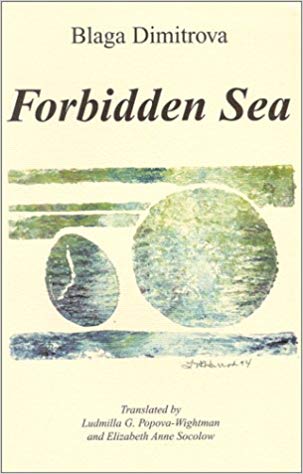Background
Blaga Nikolova Dimitrova was born on January 2, 1922, in Byala Slatina, Bulgaria. Blaga was born to a mother teacher and a father lawyer. She was raised in Veliko Tarnovo and then moved to Sofia.

1945
Blvd. “Tsar Liberator” 15, 1504 Center, Sofia, Bulgaria
Blaga Nikolova Dimitrova studied Slavic Philology at the University of Sofia and earned a bachelor’s degree in 1945.
1950
Tverskoy Blvd, 25, Moscow, Russia, 123104
In 1950 Blaga Nikolova Dimitrova gained a doctor of philosophy at the Maxim Gorky Literature Institute.







("Forbidden Sea" is a lyrical poem, which arrived suddenly...)
"Forbidden Sea" is a lyrical poem, which arrived suddenly after a bout with cancer. Her close encounter with death brought life into a sharp focus awoke in her the eternal questions about the meaning of human existence, the magnetism of love, the mysteries and the vicissitudes of human fate. The sea is present not only as a magnificent view, but also as a spontaneous rhythm, as a myth, a symbol of life, love, infinity, and freedom. Freedom was lacking in Bulgaria, a dictatorship with iron censorship, a country where not only the sea was "forbidden," but also "words!"
https://www.amazon.com/Forbidden-Sea-Bulgarian-poetry-translation/dp/1930214014/?tag=2022091-20
2000
Блага Николова Димитрова
Blaga Nikolova Dimitrova was born on January 2, 1922, in Byala Slatina, Bulgaria. Blaga was born to a mother teacher and a father lawyer. She was raised in Veliko Tarnovo and then moved to Sofia.
Blaga Nikolova Dimitrova finished High School in 1942. Blaga Nikolova Dimitrova studied Slavic Philology at the University of Sofia and earned a bachelor’s degree in 1945. In 1950 Blaga Nikolova Dimitrova gained a doctor of philosophy at the Maxim Gorky Literature Institute. She also studied piano with Andre Stoyanov.
During Blaga Dimitrova’s youth and undergraduate education, she published poetry in various student and professional journals: Blgarska rech, Prometey, Uchenicheski podem, Izkustovo i kritika and Literaturen zhivot. She was a novelist, poet, and translator at the beginning of the 1940s.
After graduating, Blaga Dimitrova explored her country and the literary world; she worked as an editor for Septemvri from 1950 to 1955 and did construction work in the Rhodopa Mountains from 1952 to 1953. Her mountain work seems to have shaped her sense of labor and womanhood. At the beginning of 1962, Blaga Dimitrova was an editor at Bulgarski pisatel and Narodna kultura.
In the 1970s, her works became more critical of the communist government, and Blaga Dimitrova received reprimands for not being politically correct. Four of the poetry books Blaga Dimitrova wrote in the 1970s- "Fireflies Fading," "Rubber Plant," "Questions," and "Hobbyada," - were all rejected by state publishing houses with no specific reason given.
During the Vietnam War (1955-1975), Dimitrova visited the country several times as a journalist. In 1991 Blaga Dimitrova became a deputy of Bulgarian parliament. In 1992 Blaga Dimitrova worked as a vice president of Bulgaria. She became a pre-eminent supporter of democracy, and one of its architects in Bulgaria.
Blaga Dimitrova was the inspiration behind John Updike's short story "The Bulgarian Poetess." In the 1980s Blaga Dimitrova rose to eminence as a Bulgaria’s greatest female poet. Dimitrova won the Lundkvist Prize in Stockholm in the 1980s for her translations of Swedish literature and also received the Herder Prize for poetry in 1992.
("Forbidden Sea" is a lyrical poem, which arrived suddenly...)
2000Although Blaga Dimitrova's earliest writings were critical of Bulgarian social conditions, intellectually Dimitrova was, by and large, a Stalinist both politically and culturally. By the 1960s, Dimitrova felt disgusted with the repressive Stalinism of the Zhivkov regime. She had democratic views.
Quotations: "Don't compromise, because later on there may be no time to say what you wanted to then."
Blaga Dimitrova was sophisticated, intellectual, deep and empathetic. She had her own principles and views and Blaga followed them through all her life.
In 1967 Dimitrova was married to literary critic Jordan Vasilev. Blaga adopted a Vietnamese girl.
